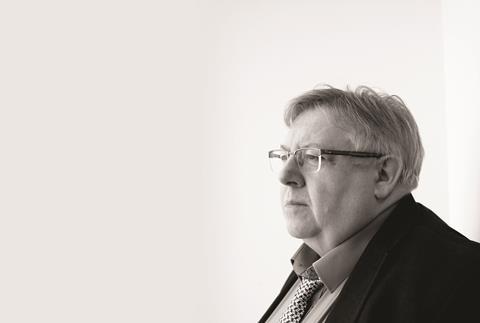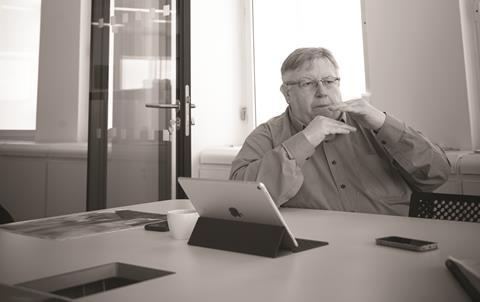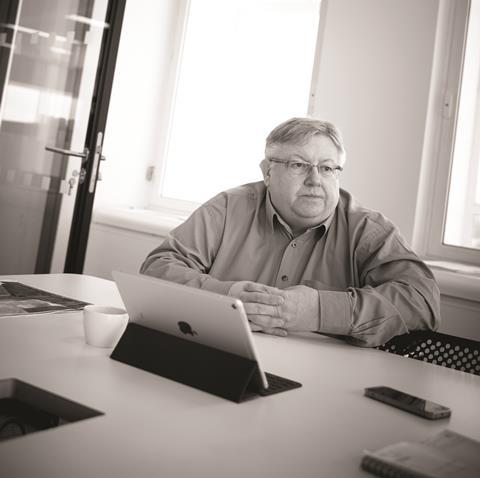Flan McNamara – or Flandad, as the grandkids call him – caught the building bug aged 11 visiting London construction sites with his uncle, a foreman. A few decades later he found himself overseeing the creation of the capital’s tallest tower. But, he tells Jordan Marshall, it’s all down to the team, not him. Photography by Julian Anderson

Before he was the man who built the Shard, Flan McNamara hailed from a town of fewer people than the iconic building can hold. He was born in a place called Kilrush in County Clare, Ireland, that is home to 3,000 people. His parents were shopkeepers. “They ran a sweet shop and a fish and chip shop,” he recalls, adding jokily: “They were definitely into shops.”
At the age of 11, McNamara and his family left those seaside vistas for the north of London, due to a lack of opportunity and an ageing community on the west coast of Ireland. “For anyone young, London was the place to be,” he says. The move launched twin passions, for Arsenal Football Club and for construction. “I’ve lived within a mile’s distance of Arsenal for the last 40 years,” he says.
The source of McNamara’s early interest in construction was his uncle Dessie, with whom the family stayed in north London when they first moved to the UK. Dessie was a ganger for Higgs & Hill, and McNamara’s weekends usually involved visiting sites with his uncle. Soon he was smitten, and went on to train as an engineer. He says of the industry: “I have done nothing else. I’ve never wanted to do anything else. I love design, and the design end of construction was something I would have always wanted to pursue,” he says.
For a man who lives in and loves the north of London, and who built the city’s tallest tower, McNamara’s latest venture entails him looking beyond the capital more than ever before. Last December he left Shard creator Sellar to join start-up developer Vanguard Real Estate, a move that McNamara, who is 60 years old, concedes may look back-to-front to many. “It’s probably a bit unusual to do this towards the end of your career rather than at the start, but I am loving the opportunity to work on multiple projects at once across different cities,” he says. “It’s completely refreshing, which is why I’ve chosen to do this now.”
”The team will deliver the job: no individuals will deliver the job. You don’t want everyone to be a superstar”
The firm has projects under way in Belfast and Glasgow, and is looking at work across Europe and India. While the venture is new, the relationships are not. Jim Osborne, who is also a director at Vanguard, worked with McNamara in Jakarta building the Sheraton hotel for Schal in 1996-97. Osborne’s son Connor also works with the company. “I have pictures of us all in Jakarta – my kids grew up with Connor – so it’s something quite special,” he says. “That is in essence what we are doing. We are keeping the good relationships we already have and building new ones.”
The importance of family to McNamara, in both a traditional and a non-traditional sense, is obvious. It is clear as he talks about his wife, Ann, and his three children and three grandchildren, who are only allowed to call him “Flandad”. And it is clear when he talks about the importance of a close-knit team on construction jobs. Straight-talking McNamara values communication and experience, saying they are critical to project success, and that his biggest pet peeve is big egos and glory hoggers in the industry.
In his new venture McNamara is taking his relationship-based approach to the UK regions – which he says are “overlooked and undervalued” – and beyond. Vanguard is currently working on the £400m Belfast Waterside project, which is set to deliver 750 homes, a hotel, offices, retail and creative space over the next five years, as well as a 280,000ft2 office building in Glasgow, which is due to go for planning in the next month. And what next? McNamara says he has never travelled more, with the firm eyeing jobs in Munich, Amsterdam, Vienna, Malta, Copenhagen and as far abroad as India. He says: “We work with local partners, and that’s what it’s all about, building those relationships.”

Lines of communication
The importance of on-site cohesion and communication was impressed on McNamara early in his career. Working on the first phase of Canary Wharf with Lehrer McGovern and Olympia & York, he recognised the usefulness of open lines of dialogue and a well-structured team. Despite the job taking place more than 25 years ago, McNamara says it is still one of the best teams he has ever been a part of.
“It was very formative for me in terms of how big projects are run, how you manage teams and how you get the best out of people. It was a very well-led and run project,” he says.
“The team will deliver the job: no individuals will deliver the job. You don’t want everyone to be a superstar, otherwise you just end up with everyone getting their egos twisted.”
In the 1990s McNamara did a couple of stints abroad, three years in Barcelona building the 48-storey Hotel Arts with Lehrer McGovern for the 1992 Summer Olympics and two years on the hotel in Jakarta for Schal, the construction management arm of Carillion. Returning to the UK, still with Schal, he worked on the refurbishment of the Royal Opera House.
From here, he took up a role with ISG, where he earned kudos while working on the firm’s Albion Riverside project, a job he says the contractor won against all odds. “We hadn’t done residential of that scale before,” McNamara says. He won industry recognition both for his management of the job and for running English lessons for foreign workers. “At the time there was a big issue about workers from Europe coming in and not understanding instructions,” he says. “It was about safety but it was also about being able to have a normal conversation. It was about making sure everyone felt they were part of the team.”
“I think openness is important – being open about praise and open about criticism and doing that in a constructive way”
McNamara credits his desire for open communication both to the jobs early in his career and to his Irish heritage. “I think openness is important,” he says, “being open about praise and open about criticism and doing that in a constructive way. You want to have open lines of communication.”
He says having the ability to speak your mind if there is a problem is key to success when running a major project. “It is relatively straightforward. The businesses that have the right culture and reward success are the ones that have good management and communication.” For McNamara, it comes naturally: “It’s very much straightforward for me with my Irish background – we are used to speaking our mind,” he says.
Irvine Sellar and the Shard
The Shard being a larger-than-life project was the vision of one man, Irvine Sellar, who died last year aged 82. “He was probably the most focused and driven person I have ever worked for,” says McNamara. “He was relentless”.
While admitting that Sellar, a man famed for his unrelenting focus, could at times be difficult, McNamara says the positives of working with him far outweighed any negatives: “He was very focused on it happening when everyone said it wouldn’t, and for that I will be eternally grateful.” McNamara recalls speaking to Sellar daily, as he needed to ensure the project was running how he wanted it to. “He’d ask questions he already knew the answer to, as he just needed to double-check everything.”
On Sellar’s relationship with Renzo Piano – the architect whose appointment came as somewhat of a surprise to the industry as he’d never previously worked in the UK – McNamara sums it up simply: “They were like brothers”. He said their shared passion for the project not only brought them together but is what got the project off the ground.
The relationship between Sellar and Sheikh Abdullah bin Mohammed bin Saud Al Thani, who helped fund the project, was also very tight, McNamara says. “They got on very well. Irvine treated the investment money as his own,” he recalls. “He was very careful with money, with the fact that we never over-ran on costs being quite an achievement really.”

Pulling together
In 2005, he began working for Multiplex, another firm he hails as having a strong management team, on its Peterborough hospital PFI project, before being transferred to the contractor’s £1.6bn White City job building the Westfield shopping centre, another scheme that had a strong influence on his career. He took on the role of construction director. Of this project, he says: “It was a fragmented team when I started, we had to reshape the team and the project. Everyone needed to be pulled together. In the end we had a fantastic team on the job.”
McNamara likens the role of managing the team at White City to being a mayor. “It was like running a town, not a site,” he says. “At its peak there were more than 10,000 people on site and they needed everything you need in a small town.”
While McNamara was at White City, Multiplex was struggling to deal with the fallout from its disastrous Wembley stadium project, which was completed in 2006 almost two years behind schedule at more than double the planned cost. The contractor was going through an overhaul and shedding high-risk projects in the UK. The changes led to the White City job being sold to another Australian firm, retail developer Westfield. “One day I was working for Multiplex, the next I was working for Westfield; it was as simple as that. My role didn’t change,” says McNamara.
Access is important
He lauds the management at Westfield, saying the team – led by head of design and construction Keith Whitmore, chief operating officer Peter Miller and Michael Gutman, then head of the company’s European arm – were among the best decision-makers he ever worked with. “You could always get onto who you needed to and they would make decisions effectively and quickly,” he says. “Access is unbelievably important.”
Reflecting on the job, McNamara says some of his favourite times were taking co-chief executive of Westfield, Steven Lowy, on site visits every three months. “He justified his visits. He added value to the project every time he came – and while that usually meant more work for me, it was always worth it,” he says.
The biggest turning point in the project, says McNamara, was refocusing the rail works, which saw the sidings for the Central line moved underground. “If we hadn’t got that back on track, there wouldn’t have been a shopping centre,” he says. While the Shard may be what McNamara is best known for, it competes for top place in his mind with White City. “It’s funny because one is essentially a groundscraper, while the other is a skyscraper, but they are both jobs I’m glad I was involved in.”
McNamara was first approached to work on the Shard by Irvine Sellar in 2007 while still working at White City. “I was very close to going then, but after talking to Peter Miller I really wanted to stay and finish the project at White City,” he says. When the project wrapped in the first quarter of 2009, McNamara admits he could have stayed with Westfield, but felt it was time for something new, so joined Sellar’s team working on the London Bridge project.
“I was brought in to work on the News �ڶ����� originally and I took on a lot of the public transport and realm works needed for the Olympics,” he recalls. Sellar project manager Bernard Ainsworth was originally in charge of the Shard but made the decision to step back from the day-to-day running of the site, says McNamara. “Bernard was taking a step back with an eye on retiring,” he says with a laugh, “something he still hasn’t done. So I transitioned into managing more of the day-to-day aspects of the job.”
McNamara says he loves seeing the building on the skyline when driving around London. He attributes the project’s success largely to the input of Irvine Sellar himself and architect Renzo Piano, as well as to contractor Mace’s commitment to getting it done. The scheme was Mace’s first as main contractor. “Mace’s appointment did surprise some, but they were the only firm who confidently came forward with a price and said ‘we can do this’,” says McNamara. “Gareth Lewis [chief operating officer] was on site full-time and the job had the attention of Steve Pycroft [chief executive] so any hurdle was cleared.”
While keen to share the glory with others, McNamara can’t hide from the achievement of managing the construction of London’s tallest building. “Of course I’m incredibly proud,” he says of the Shard: “It redefined London.”
McNamara’s passion for the industry is obvious: he lives and breathes it. It offers endless opportunities, he says: “Everything is open to you. If what you want to do is run major industry projects then you can do that – you just have to be prepared to work for it. If you do that, the sky is the limit.”



























No comments yet